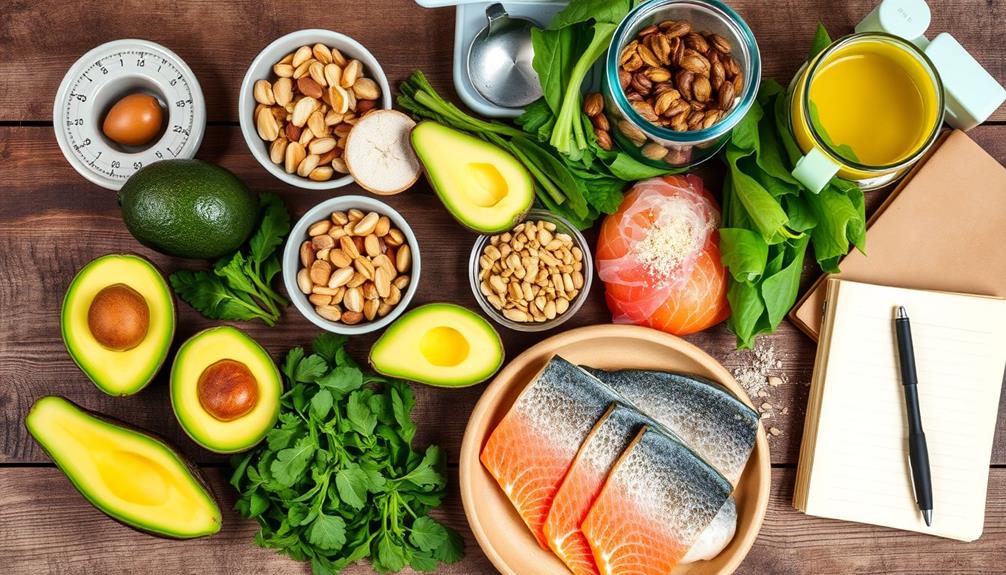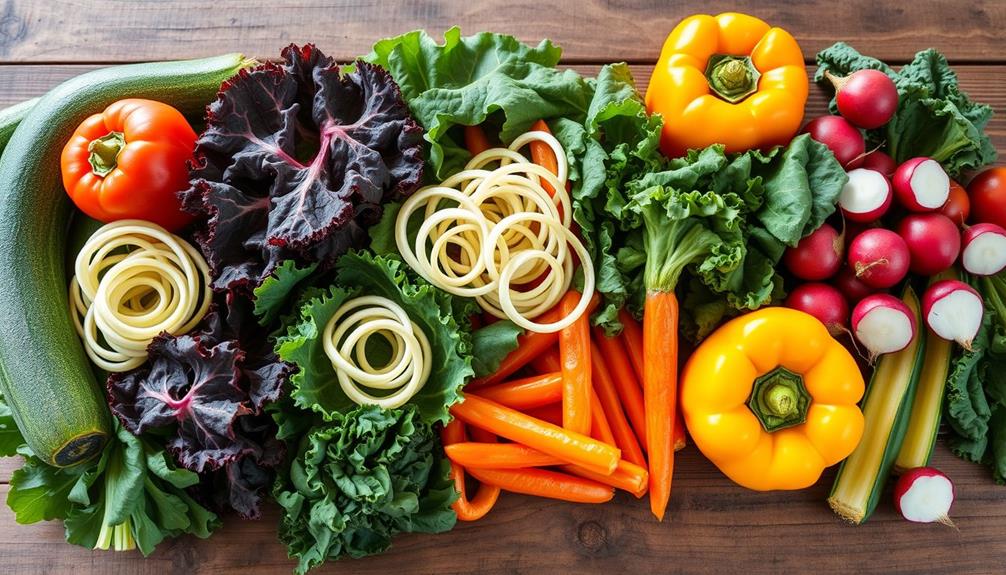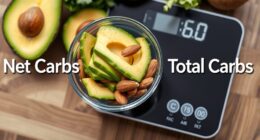To maintain your weight on a keto diet, start by ensuring your caloric intake matches your Total Daily Energy Expenditure (TDEE). Focus on nutrient-dense, low-carb foods like leafy greens, lean proteins, and healthy fats. Gradually increase your carb intake by about 10 grams daily, prioritizing whole foods. Don't forget to track your macronutrient ratios and incorporate intermittent fasting if it suits you. By managing portions and choosing quality ingredients, you can achieve balance. There's a wealth of strategies to keep you on track, so you'll want to explore more tips and inspirations for your journey.
Key Takeaways
- Track your Total Daily Energy Expenditure (TDEE) to align caloric intake with energy needs for effective weight maintenance on keto.
- Gradually reintroduce healthy carbs, focusing on whole food sources to stabilize weight without compromising your keto approach.
- Prioritize protein intake, ensuring 10-20% of total calories come from lean sources to support muscle maintenance and satiety.
- Incorporate low-carb vegetables and healthy fats to enhance fiber intake and keep energy levels stable while avoiding high-sugar and ultra-processed foods.
- Engage in community support and utilize meal planning tools to stay motivated and accountable in your weight maintenance journey.
Options for Maintaining Weight

When you've reached your weight loss goals on the keto diet, maintaining that weight can feel challenging, but it doesn't have to be. To keep your weight stable, start by ensuring your caloric intake matches your Total Daily Energy Expenditure (TDEE). For most women, that's around 2,000 calories a day, while men may need about 2,500, depending on activity levels.
Additionally, consider incorporating foods rich in antioxidants, such as celery juice, which can support your overall health while maintaining a balanced diet.
Gradually increasing your carb intake by 10 grams daily can help you stabilize your weight, focusing on healthy, whole food sources like vegetables, fruits, and whole grains.
Don't forget the importance of protein; it's essential for muscle gain and helps keep you feeling full. Incorporating resistance training into your routine won't only support muscle gain but also help you maintain low body fat.
Consider utilizing intermittent fasting as a strategy to simplify weight maintenance. It naturally reduces calorie intake and gives you flexibility with meal timing.
Regularly monitoring your weight and dietary habits is key. Adjust your macronutrient ratios as needed, and you'll find it easier to maintain your weight while enjoying the benefits of the keto lifestyle.
Reader Success Stories

Many people find inspiration and motivation through the success stories of others who've navigated the challenges of weight maintenance after achieving their goals on the keto diet.
Take Joanie, for instance. She lost 20 pounds on keto and is now considering a modified keto or paleo approach to maintain her weight.
Nina Shapiro also surpassed her initial weight loss goal and is focused on keeping her current weight, demonstrating how successful weight maintenance is achievable.
This journey aligns with the importance of fostering a digital-friendly environment at home, as families can use technology to share and support each other's health goals through creative projects.
The supportive community surrounding the keto diet is filled with reader comments sharing personal success stories and tips for weight maintenance.
Many readers express feeling empowered by their journeys, which fosters motivation and encouragement.
Their experiences highlight that maintaining your weight after significant loss isn't just about calorie deficit or reducing carbohydrate consumption—it's about finding a sustainable approach that works for you.
Whether it's through meal plans tailored to individual preferences or healthy eating habits that fit your lifestyle, these stories illustrate diverse strategies that can help anyone avoid gaining weight after achieving their goals.
Embrace their journeys as you undertake your own path to successful weight maintenance!
Nutrition Tips for Maintenance

Maintaining your weight on the keto diet requires a strategic approach to nutrition that balances your caloric intake with your energy expenditure. To effectively manage your weight, consider these essential tips:
- Track Your Total Daily Energy Expenditure (TDEE): Aim to consume calories that match your TDEE, generally around 2,000 calories for women and 2,500 for men, adjusting based on your activity level. Understanding your budget for calories is vital for successful weight management.
- Gradually Add Healthy Carbs to Your Diet: Slowly increase your carbohydrate intake by about 10 grams per day, focusing on healthy, nutrient-dense carbs like vegetables, fruits, and whole grains to stabilize your weight without exceeding your carb limit.
- Incorporate Lean Protein: Guarantee 10-20% of your total calories come from lean protein sources. This supports muscle mass and increases the thermic effect, helping you burn more calories during digestion.
- Monitor Macronutrient Ratios: Regularly assess your macronutrient ratios to maintain a balance that supports your energy needs while keeping carbs low, typically around 5-10% of total caloric intake.
Utilizing Medium-Chain Triglyceride (MCT) oil can also help maintain ketosis while supporting your weight management efforts.
Foods to Include and Avoid

Your food choices play an essential role in maintaining weight on the keto diet. Focus on incorporating nutrient-dense foods to include, like low-carb vegetables such as spinach, kale, and broccoli. These options help you keep your fiber intake high while keeping grams of net carbs low.
Additionally, incorporating a balanced diet rich in healthy fats and proteins is essential for overall health and satiety, as emphasized in effective strategies for weight loss. Don't forget to add healthy fats like avocados, olive oil, and nuts; they provide satiety and energy without pushing your carb limits.
When it comes to protein sources, prioritize lean options like chicken, fish, and eggs. They're critical for muscle maintenance and overall health. You can also indulge in small portions of low-carb fruits like strawberries and raspberries. These fruits deliver vitamins and antioxidants without greatly increasing your carb intake.
On the flip side, be mindful of foods to avoid. Steer clear of high-sugar foods, ultra-processed foods, and grains, as they can lead to weight gain by rapidly increasing your carb intake and disrupting ketosis.
Expert Resources for Support

Support is vital when steering through the challenges of maintaining weight on a keto diet. By leveraging expert resources, you can effectively manage your nutritional needs and stay on track. Here are some valuable resources to take into account:
1. Consulting a Registered Dietitian: They can provide personalized strategies for maintaining weight and preventing nutritional deficiencies, ensuring you meet your dietary goals.
Additionally, understanding how to balance your macronutrients is fundamental for long-term success, as highlighted in cold medications overview.
2. Meal Planning Tools: Utilize online resources and apps to simplify meal planning. These tools help you stay aligned with your macronutrient ratios and caloric needs for maintenance.
3. Community Support Groups: Engaging with both online and in-person groups fosters motivation and accountability. Sharing experiences with others can make it easier to stick to your weight maintenance plan.
4. Tracking Food Intake: Use apps to monitor your caloric consumption and macronutrient ratios. This practice helps you stay within your target ranges, maintaining weight effectively.
Regular consultations for health assessments will also provide insights into how your body is responding to the keto diet. This information can guide necessary dietary adjustments, ensuring you stay healthy and balanced on your keto journey.
Frequently Asked Questions
How Do You Maintain Your Weight on Keto Diet?
To maintain your weight, monitor your caloric intake, balance healthy fats, proteins, and carbs, and adjust your diet as necessary. Regularly assess your eating habits to guarantee you're meeting your energy needs efficiently.
How Do I Stay on Keto Without Losing Weight?
To stay on keto without losing weight, focus on balancing your caloric intake with your energy expenditure. Incorporate healthy fats and proteins, and gradually adjust your carb intake while monitoring your weight regularly.
Do You Stop Losing Weight on Keto?
They say, "What goes up must come down." If you're not losing weight on keto, your body might be adapting. Monitor your intake, address stress, and guarantee you're getting enough sleep to keep progress moving.
Why Am I Not Losing Weight on Keto After 2 Weeks?
If you're not losing weight on keto after two weeks, you might be eating hidden carbs, not tracking macros accurately, or lacking a calorie deficit. Stress and individual metabolism can also affect your progress.
Conclusion
So, you've mastered the art of weight loss on keto—congratulations! Now, maintaining that hard-earned figure is like keeping a cat off a hot tin roof: tricky and a little chaotic. Just remember, balance is key, even if that balance means occasionally flirting with carbs. Embrace the absurdity of counting net carbs while dreaming of pasta. With the right mindset and a touch of humor, you'll keep those pesky pounds at bay while enjoying your culinary adventures.









